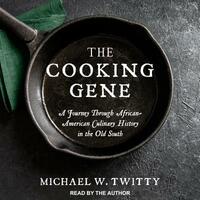Take a photo of a barcode or cover
537 reviews for:
The Cooking Gene: A Journey Through African-American Culinary History in the Old South
Michael W. Twitty
537 reviews for:
The Cooking Gene: A Journey Through African-American Culinary History in the Old South
Michael W. Twitty
I have read as much of this book as I can stand. I read the first 30 pages or so, jumped to the chapter called “Mishpocheh” and gave up.
I FELT like I was reading, but at the end of a paragraph, page, or chapter, I could not summarize what Twitty had just said. So it’s a waste to spend any more time “reading.” Nothing is sinking in.
(Deep sigh.) Michael Twitty is so well regarded. Maybe he’s a different person face to face.
In the interests of full disclosure, I will add that Twitty’s appearance — he is clinically obese — was a negative for me before I even opened the book. So I suppose you can say I did judge this book by its cover.
I said that “nothing sank in” but that is not exactly true. I did get what Twitty said about the visitor experience to a plantation. A plantation (I mean one of those white columned houses from the 18th to 19th centuries) is multiple experiences simultaneously:
Experience 1
———————
Some white people will see it partly (or exclusively) as “a place where people lived in luxury, despite the lack of modern conveniences.”
Experience 2
———————
Other white people might see it as the first — a place of luxury — while acknowledging that the luxury for a few was built on the misery for many.
Experience 3
———————
Black people will see it as a prison, at best. At “best” because the prisoners were innocent of any crime.
Twitty points out that guides typically present Experience 1. And so black visitors (and whites whose reaction is experience 2) will, at best, shake their heads in disbelief. How can that nice guide be standing knee deep in shit while pretending that she smells nothing?
I FELT like I was reading, but at the end of a paragraph, page, or chapter, I could not summarize what Twitty had just said. So it’s a waste to spend any more time “reading.” Nothing is sinking in.
(Deep sigh.) Michael Twitty is so well regarded. Maybe he’s a different person face to face.
In the interests of full disclosure, I will add that Twitty’s appearance — he is clinically obese — was a negative for me before I even opened the book. So I suppose you can say I did judge this book by its cover.
I said that “nothing sank in” but that is not exactly true. I did get what Twitty said about the visitor experience to a plantation. A plantation (I mean one of those white columned houses from the 18th to 19th centuries) is multiple experiences simultaneously:
Experience 1
———————
Some white people will see it partly (or exclusively) as “a place where people lived in luxury, despite the lack of modern conveniences.”
Experience 2
———————
Other white people might see it as the first — a place of luxury — while acknowledging that the luxury for a few was built on the misery for many.
Experience 3
———————
Black people will see it as a prison, at best. At “best” because the prisoners were innocent of any crime.
Twitty points out that guides typically present Experience 1. And so black visitors (and whites whose reaction is experience 2) will, at best, shake their heads in disbelief. How can that nice guide be standing knee deep in shit while pretending that she smells nothing?
emotional
hopeful
informative
reflective
slow-paced
I listened to this on audio-book read by the author. I thoroughly enjoyed his prose as he travelled between worlds of food, geography, ancestral DNA, and his call to worship in the way that he does. The book is inspiring me to take on a culinary ancestral ethnobotanical journey of my own to contribute to my family as well as the story of the planet. I will be buying the book. I want it on my shelf.
A complex and truly different book, thinking about food and our connections through food over time and space. Beautifully written.
The tagline made me think this was going to be a lot more culinary history and a lot less genealogy. I found it impossible to keep track of all the generations and their connections. Just not for me.
challenging
informative
reflective
slow-paced
challenging
emotional
funny
hopeful
informative
inspiring
reflective
sad
fast-paced
emotional
informative
medium-paced
informative
reflective
medium-paced
Riveting, beautifully written, and incredibly important piece of work examining the story not only of blood and bone, but of stomach and how they comprise a person and a people. I grew up with Southern roots filtered through a mother who eschewed her White Southern youth and upbringing in favor of the more relaxed and blue-collar Appalachian side of her family. Mom didn't make cornbread, made biscuits out of a can, and only her fried chicken was anything Southern to speak of. Even then, it wasn't reeeeally Southern fried chicken, more of a hastily cobbled together Northern stab at Southern cuisine through the lens of Southwestern Pennsylvania.
Even then, however, she sang songs to me from her childhood, and the stories behind those songs run the gamut from old work-songs of the enslaved, songs sung by enslaved workers to tell their children where to find and how to pick the wild produce like pawpaws and persimmons, and I'm sure songs with a darker undertone than a simple children's song. There were family stories with an uncomfortable nod at the past no one spoke of, the racist behavior and prejudice practiced without thought while being denied in the same breath.
So this book, for me, was an important look at that past I rarely look into because I wasn't raised in its heart. It was a perspective on the South I was missing, simply by virtue of being born white. And while reading about history is essential, really trying to experience it through the eyes of someone kind enough to so eloquently escort you through his own internal and external journey is a rare experience. I would recommend this to anyone, and everyone. Food is what brings us together as people, and only when we can know it and experience all of its meaning can we use it for good and for peace, and for justice.
Even then, however, she sang songs to me from her childhood, and the stories behind those songs run the gamut from old work-songs of the enslaved, songs sung by enslaved workers to tell their children where to find and how to pick the wild produce like pawpaws and persimmons, and I'm sure songs with a darker undertone than a simple children's song. There were family stories with an uncomfortable nod at the past no one spoke of, the racist behavior and prejudice practiced without thought while being denied in the same breath.
So this book, for me, was an important look at that past I rarely look into because I wasn't raised in its heart. It was a perspective on the South I was missing, simply by virtue of being born white. And while reading about history is essential, really trying to experience it through the eyes of someone kind enough to so eloquently escort you through his own internal and external journey is a rare experience. I would recommend this to anyone, and everyone. Food is what brings us together as people, and only when we can know it and experience all of its meaning can we use it for good and for peace, and for justice.







